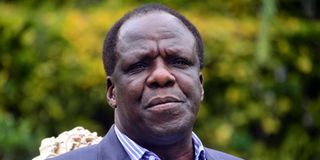Governors’ media attacks anti-devolution

Council of Governors Chairman Wycliffe Oparanya.
What you need to know:
- MOA chairman Wachira Waruru said the move had the potential of setting a bad precedent in engagements between the media and public institutions.
Over the past few weeks, the Nation has dedicated acres of newspaper space to expose suspected loss of public funds in the counties.
And last Wednesday, the Council of Governors (CoG), under the chairmanship of Kakamega Governor Wycliffe Oparanya, threatened, in a statement, to pull out adverts from Nation Media Group platform.
The CoG urged all county governments to “immediately cease engaging NMG merchandise and advise county officers about the move until further notice”.
The county chiefs also warned other media houses of carrying stories of suspected misappropriation of public funds in the counties “without verifiable proof”.
The CoG, interestingly, is unhappy with the Nation’s reporting of the impending arrests of several governors over allegations of abuse of office and corruption in their respective counties.
The Media Council of Kenya (MCK), Media Owners Association (MOA) and Kenya Editors Guild (KEG) greeted the statement and threats with condemnation and an unabashed phlegm, terming the governors’ move a serious threat against the independence of the media.
As MCK chairperson David Omwoyo noted, the governors ought to know they are accountable to the public for the use of funds in their respective counties and that the public, through the media, have a right to question and hold them to account and hold views that are different from those propagated by their communication machinery.
MOA chairman Wachira Waruru said the move had the potential of setting a bad precedent in engagements between the media and public institutions.
Our (dis)honourable governors’ behaviour is only redolent of Donald Trump’s and Boris Johnson’s — the president of the United States and prime minister of the United Kingdom, respectively — sworn enemies of press freedom and the truth, which has made the people in their constituencies and around the world to view them with cynicism.
During US third president Thomas Jefferson’s public life, journalists, including James Thomson Callender, Jefferson’s friend-turned-foe, dredged up sleaze involving politicians and other public officers. Callender exposed Jefferson’s supposed and apocryphal liaison with the black slave girl Sally Hemings and married women Betsey Walker and Maria Reynolds.
Martin Bell, the journalist and author who covered the Bosnian War of 1992-95 for the BBC, wrote that in the news business it’s the scribes’ involvement that makes for good journalism. Warning to a household worries the gatekeeper most; it’s that which puts historians, whistleblowers, artists and the media in the same box as sentries. Leave our media be.
Mulang’o Baraza, historian and writer, Nairobi




